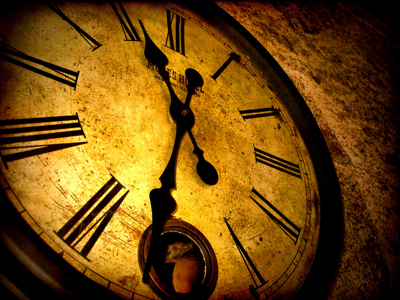
Today, October 24th, is Take Back Your Time Day. Simply put, Take Back Your Time Day is for our harried schedules what Earth Day is for the natural environment.
Consider this. Hours spent at work peaked during the industrial era. In the late 19th and early 20th century, labor unions secured a string of successes in the shorter hours movement–first the 12-hour day, then the 10-hour day, the eight-hour day, and finally the five-day week. Imagine: From 80-hour weeks to 40-hour weeks in about half a century! The expectation, of course, was that this trend would continue. Social pundits contemplated the “problem of leisure,” and state universities founded departments of leisure studies both to study the phenomenon of leisure and also to train recreation specialists to supervise leisure pursuits in the new age to come.
Then, something happened–slowly and unnoticeably at first, but over time it became unmistakable. We got busier. In his 1970 book The Harried Leisure Class, Staffan Linder challenged the notion that time equals money. More money, he argued, meant more shopping and therefore less time. More recently Juliet Schor has argued that we are busy because the American workweek has been getting longer since the 1950’s–that we are a harried working class. Whereas Europeans have converted postwar productivity into increased time off from work, she writes, Americans have use their increased productivity to buy more stuff. Indeed, newly constructed houses are on average twice the size of homes built prior to WWII.
Schor’s thesis is not entirely uncontroversial. Those employing time diary methods for calculating hours at work end up with different data. And one must point out that the longer vacations in Europe are in most cases part of more centralized economies and coincide with higher rates of unemployment. As the Wall Street Journal has argued, the freer the market economy, the shorter the vacations, but the lower the unemployment.
Nevertheless, the point remains. We Americans, we westerners–perhaps we humans–are harried. Why? There are too many reasons to name, but they include the following. We buy homes in the suburbs which increases our commute. We build bigger homes which increases the maintenance. We buy labor saving appliances and then feel that we must enroll in the local fitness club. It’s a cycle of consumption that leaves us rich in things but poor in time.
As David Brooks among others has pointed out, we are the first culture in history where the wealthy choose to work like slaves while the poor struggle with involuntary leisure–i.e., unemployment. Again, there are many reasons for this, inicluding the ubiquity of information technologies that follow us everywhere, but the primary reason is almost certainly that of identity formation. In his book Bobos in Paradise, Brooks illustrates this phenomenon with examples from the New York Times wedding page. As recently as the 1950’s it is clear from wedding descriptions that identity was rooted in family: “She is descended from Richard Warren, who came to Brookhaven in 1664. Her husband, a descendant of Dr. Benjamin Treadwell, who settled in Old Westbury in 1767, is an alumnus of Gunnery School and a senior at Colgate University.” Today, by contrast, identity is rooted in personal accomplishment. When you look at the wedding page, Brooks writes, “you can almost feel the force of the mingling SAT scores. It’s Dartmouth marries Berkeley, MBA weds Ph.D., Fulbright hitches with Rhodes, Lazard Freres joins with CBS, and summa cum laude embraces summa cum laude (you rarely see a summa settling for a magna–the tension in such a marriage would be too great). The Times emphasizes four things about a person–college degrees, graduate degrees, career path, and parents’ profession–for these are the markers of upscale Americans today.”
If it is true that we are what we achieve and produce, then it follows that we must continually prove ourselves. Which is to say that we must constantly work. And work. And work.
One of the challenges facing Christians today is resisting this tendency to define ourselves according to our productivity, and to ground our identity in the person of Christ. In the creation narrative of Genesis, God creates, steps back from his creative activity and enjoys it by proclaiming “It is good.” Herests. Not because he is tired, mind you. But because rest is good. God’s rest is not merely the opposite of work; it is the opposite of restlessness. It is the opposite of anxiety, worry, of cosmic anomie. Which is to say it is the very thing we need at this cultural moment. We are invited to join him in stepping back from our work, looking back on it, and enjoying it. For many of us, this kind of rest is hard work.
Take Back Your Time Day is still a new movement. There is no telling where it will lead, but the cause is a good one. It should not be lost on those of us who read Scripture that the first thing God calls holy is time. The scriptural themes of rest and even of identity formation should have something to contribute to this conversation.
The significance of October 24th? It is the day that “falls nine weeks before the end of the year and symbolizes the fact that we Americans now work an average of nine full weeks more each year than do our peers in Western Europe.”

